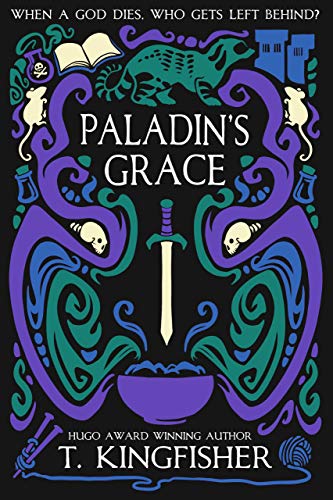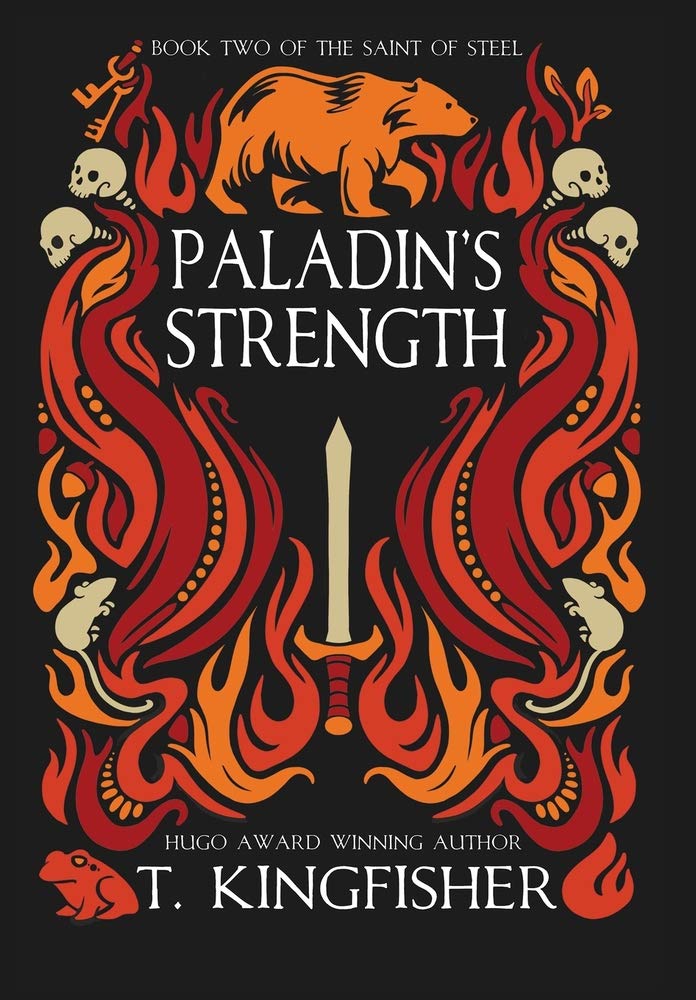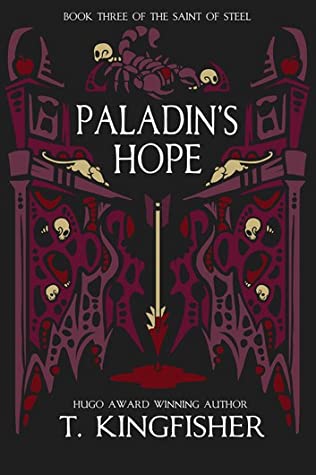Did you know that T. Kingfisher, authoress of the phenomenal horror novels The Twisted Ones and Hollow Places, heroine of the pandemic who gave us A Wizard’s Guide to Defensive Baking, and the brilliant imaginatrix of fairy-tale reimaginings like Briony and Roses and The Seventh Bride also does high fantasy? Of course she does. She can do anything, and she can do it with a pun.

Paladin’s Grace starts us with the distressing premise of a paladin without a god—because the Saint of Steel is dead. As are most of His paladins, destroyed by the soul-rending madness of losing their god. Only Stephen and a few others remain. Stephen is largely biding his time until death by trying to be useful, although his talents are perhaps not finding their best expression in the middle of a city, taken in by a god who is a warrior only in the most metaphorical sense. The White Rat fights illness, fights court battles, and fights unjust governance—big fellows with swords are window dressing more than anything else, but Stephen will take it. He’s even content with it. But then he meets a very talented perfumer with a mysterious and tragic past, and she understands what it means to lose everything. They might have even more in common than that, but to find out they’ll have to survive their personal demons coming back to destroy them. (Not actual demons, though. That’s other books.)
Paladin’s Grace is a pun, too, because the female lead is named Grace and yes, that’s cute. I don’t know if I could have stood the kinds of contortions required to keep up that trend, though, and I’m glad Kingfisher didn’t try. The next book in the series has the straightforward title Paladin’s Strength, and it does feature meditations on the nature of true strength, the quandries of physical strength when you and your world are eager for justice but disposed toward violence, and also the challenges of being a very large and strong person. Nobody is named Strength, however, and that’s for the best.

Paladin’s Strength features Ishtvan, who is brawny even by paladin standards and has a complicated relationship to power. He’s wary of abusing his physical power, and years of mourning have left him uncertain about the application of political and spiritual power as well. He’s not sure where and how he fits into the world anymore, but he’s more than willing to focus on the smaller, achievable goals like tracking down killers and helping imperiled nuns, rather than moping like some of his brothers.
Only, maybe the nuns aren’t quite as periled as he thought. And maybe he could use a bit of assistance, rather than being the one who always has to be the strongest guy in the room.
And now the latest volume, Paladin’s Hope, is here as of October 9th, featuring the most handsome man in the room, Galen. It also features a gruesome gauntlet of death, some real talk about race relations and police violence, and the surprising salvific properties of apples. Does that not sound like a recipe for an adorable romance? Well, you’re wrong if you think otherwise, because Romance is more than corsets and heaving. It’s allowed to be funny and serious along with being cute and horny, and Paladin’s Hope is all of those things.

Paladin’s Hope has less angst than the other two, though I think mostly only by virtue of being shorter. The Thing Keeping the Lovers Apart is (as with the other two books) mostly psychological in nature, and also is once again is thoughtfully grounded in the characters and their individual trauma. There’s still a lot of nuance, and I can’t tell you how nice it is to see people grappling with complex feelings rather than bumbling through misunderstandings.
Also, I should emphasize that this is the latest volume and not the last. This is not a trilogy, and thank goodness for two very major reasons: (1) I want more, and (2) THAT CLIFFHANGER, THO. I screeched. I squawked. I may have done a bit of flailing. And then I eventually just went back and started Clockwork Boys over again, because those are set in the same world as the Paladin series. They are also adorable and terrible and funny in turns, or sometimes all at once. Such is the magic and endless joy of T. Kingfisher.
